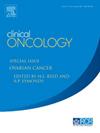Immune-related and Common Adverse Events With Programmed Cell Death 1/Programmed Cell Death Ligand 1 inhibitors combined with other Anticancer Therapy for Solid Tumors: A Systematic Review and Meta-analysis
IF 3.2
3区 医学
Q2 ONCOLOGY
引用次数: 0
Abstract
Aims
The combination of programmed cell death 1 (PD-1)/programmed cell death ligand 1 (PD-L1) inhibitors and anticancer therapies has been in the spotlight in recent years. However, the risks associated with these combination therapies are not fully elucidated. The primary objective of this study was to evaluate the relative risk of organ-specific immune-related adverse events (irAEs) and common adverse events (AEs) in patients treated with PD-1/PD-L1 inhibitor–based combination therapies compared to those treated with PD-1/PD-L1 inhibitor monotherapy for solid tumors.
Materials and methods
An electronic database search was performed using ClinicalTrials.gov, Medline, and American Society of Clinical Oncology (ASCO)/European Society for Medical Oncology (ESMO) annual meeting libraries. We included randomized controlled trials designed to assess the safety of combination therapies using PD-1/PD-L1 inhibitors and other anticancer drugs. All the selected clinical studies included solid tumors and provided information on the incidence of nonserious and serious AEs. The quality of evidence was assessed using the Cochrane risk-of-bias tool. A meta-analysis was performed using random-effect models to pool the results.
Results
The primary analysis included 16 relevant clinical studies comprising 4232 patients, of whom 2071 and 2161 patients received PD-1/PD-L1 inhibitor–-based combination therapy and PD-1/PD-L1 inhibitor monotherapy, respectively. Serious organ-specific irAEs were infrequent, even when PD-1/PD-L1 inhibitors were combined with other anticancer drugs. The incidence of serious colitis was significantly higher in the combination therapy group than in the monotherapy group. Among the common AEs associated with PD-1/PD-L1 inhibitors, the incidence of serious pyrexia/fever, nonserious pyrexia/fever, fatigue, nausea, decreased appetite, vomiting, diarrhea, dyspnea, and rash significantly increased in the combination therapy group. In the subgroup analysis based on the modes of action of concomitant anticancer drugs, the combination of PD-1/PD-L1 inhibitors and DNA synthesis inhibitors significantly increased the risk of serious colitis compared to PD-1/PD-L1 inhibitor monotherapy.
Conclusion
Organ-specific irAEs occur infrequently when combinations of PD-1/PD-L1 inhibitors and other anticancer drugs are used. However, the risk of serious colitis and certain AEs is higher than that associated with PD-1/PD-L1 inhibitor monotherapy. Vigilant monitoring of AEs and implementation of appropriate clinical management strategies guided by the mode of action of the combination drugs are essential.
程序性细胞死亡 1/程序性细胞死亡配体 1 抑制剂联合其他抗癌疗法治疗实体瘤的免疫相关不良事件和常见不良事件:系统回顾与元分析》。
目的:近年来,程序性细胞死亡1(PD-1)/程序性细胞死亡配体1(PD-L1)抑制剂与抗癌疗法的联合应用一直备受关注。然而,这些联合疗法的相关风险尚未完全阐明。本研究的主要目的是评估与接受PD-1/PD-L1抑制剂单药治疗的实体瘤患者相比,接受基于PD-1/PD-L1抑制剂的联合疗法治疗的患者发生器官特异性免疫相关不良事件(irAEs)和常见不良事件(AEs)的相对风险:使用ClinicalTrials.gov、Medline和美国临床肿瘤学会(ASCO)/欧洲肿瘤内科学会(ESMO)年会图书馆进行电子数据库检索。我们纳入了旨在评估使用 PD-1/PD-L1 抑制剂和其他抗癌药物的联合疗法安全性的随机对照试验。所有入选的临床研究均包括实体瘤,并提供了非严重和严重AE发生率的信息。证据质量采用 Cochrane 偏倚风险工具进行评估。采用随机效应模型进行荟萃分析以汇总结果:主要分析包括16项相关临床研究,涉及4232名患者,其中2071名和2161名患者分别接受了基于PD-1/PD-L1抑制剂的联合治疗和PD-1/PD-L1抑制剂单药治疗。即使PD-1/PD-L1抑制剂与其他抗癌药物联合使用,严重的器官特异性irAEs也不常见。联合治疗组严重结肠炎的发生率明显高于单药治疗组。在与PD-1/PD-L1抑制剂相关的常见AEs中,联合治疗组的严重发热/发热、非严重发热/发热、疲劳、恶心、食欲下降、呕吐、腹泻、呼吸困难和皮疹的发生率明显增加。根据同时服用的抗癌药物的作用模式进行的亚组分析显示,与PD-1/PD-L1抑制剂单药治疗相比,PD-1/PD-L1抑制剂和DNA合成抑制剂联合治疗会显著增加严重结肠炎的风险:结论:PD-1/PD-L1抑制剂和其他抗癌药物联合使用时,器官特异性irAEs发生率较低。然而,与 PD-1/PD-L1 抑制剂单药治疗相比,发生严重结肠炎和某些 AEs 的风险更高。在联合用药的作用模式指导下,密切监测 AEs 并实施适当的临床管理策略至关重要。
本文章由计算机程序翻译,如有差异,请以英文原文为准。
求助全文
约1分钟内获得全文
求助全文
来源期刊

Clinical oncology
医学-肿瘤学
CiteScore
5.20
自引率
8.80%
发文量
332
审稿时长
40 days
期刊介绍:
Clinical Oncology is an International cancer journal covering all aspects of the clinical management of cancer patients, reflecting a multidisciplinary approach to therapy. Papers, editorials and reviews are published on all types of malignant disease embracing, pathology, diagnosis and treatment, including radiotherapy, chemotherapy, surgery, combined modality treatment and palliative care. Research and review papers covering epidemiology, radiobiology, radiation physics, tumour biology, and immunology are also published, together with letters to the editor, case reports and book reviews.
 求助内容:
求助内容: 应助结果提醒方式:
应助结果提醒方式:


